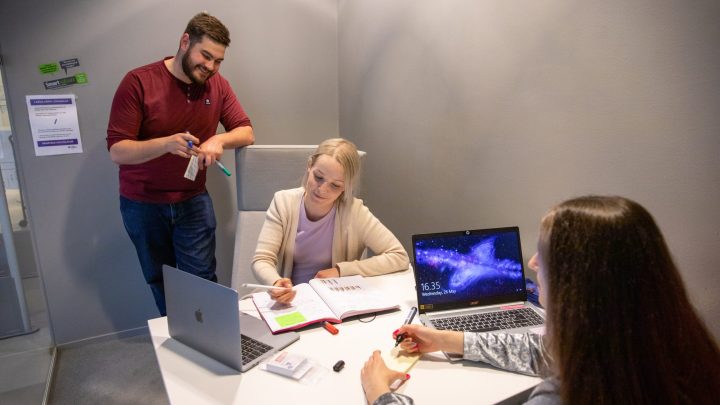I don’t speak Finnish, mutta ymmärrän kyllä
Mikä ei kuulu joukkoon: inessiivi, elatiivi, illatiivi, vai einatiivi? Viimeinen ei aina yliopistoyhteisössämme kuulu joukkoon, which is why I am switching to English here. The above joke does not translate, which is kind of the point: non-native Finnish speakers are at times disadvantaged or forgotten at our university.
The University of Turku is a Finnish-speaking university, proudly once the first one of its kind – Finnish is deeply ingrained in us, and that will not change. But the University of Turku is also an international English-speaking community – we are proud of that too. And that will change, namely towards a community that is even more international.
It may seem that language is a non-issue: we have many international PhDs and postdocs, a notable number of international Master’s students, and a handful of non-Finns as professors, and much (most?) of the scientific discourse is in English. This, however, is what is new (and exciting!): of the seven most recent professor hires (of all ranks) to the Faculty of Technology, six do not speak (much) Finnish. Prior to these recruits, the entire Faculty had two non-native Finnish speakers as professors, both fluent in Finnish long before becoming professors. Now we have one department that has as many professors who do not speak Finnish as ones who do. I hear stories that confirm a similar trend in other Finnish universities (in engineering fields).
This fast-evolving language-scape is an opportunity to improve and rethink how to best support all members of our increasingly diverse academic community. Thankfully, we are already doing many things fine, and even well.
- Most of our public events, seminars, webinars, etc. are in English.
- We do a fair job with communications: emails and news items from the central administration are in both English and Finnish; our websites and even the Intranet are to a large degree bilingual. Information provided by faculties and departments are more spotty, though. Ideally, these parts of the Intranet would be bilingual too, but certainly in the Faculty of Technology, we lag behind. One reason is that our Intranet and web page framework are not the most conducive for perfectly synchronized dual language content—the English and Finnish pages are essentially completely independent sites (I have some ideas for how to fix this, but that is for another blog entry).
- We teach in both languages, and offer a large selection of programs and courses for international Master’s students. While this is not yet the case for Bachelor’s students, Bachelor’s programs will probably start to appear soon.
But we make mistakes too. Two examples from our faculty’s short history:
- On a Viima-discussion board for our faculty, the conversation about the faculty’s language policy was in Finnish. Duh!
- We sent our young international tenure track professors to (expensive) academic leadership training, where several sessions and subsequent discussions were in Finnish only. We took corrective action midway, but duh2!
The end result in both of these cases was that some missed out on being included, and others missed out on hearing the views of the excluded.
The last bastions that operate primarily in Finnish are found in the (administrative) organs that discuss and plan how we conduct our business and make decisions, both routine and strategic. For example, our faculty boards operate in Finnish; our rules and policies are in (complex) Finnish. Should we try to change that? Add English as an official administrative language?
Perhaps not, but when we have units where half of professors are not Finnish-speakers, we should find ways to make administrative forums more accessible to everyone. For example, it could become the norm that faculty boards can have members who understand Finnish well enough to follow discussions, but prefer to use English to express their views. And to various less formal committees and working groups (departments’ and faculties’ committees on teaching, research, continuous education, outreach, many university level committees, what have you), we should not hesitate to appoint members regardless of their Finnish competence level.
We, and surely many other faculties and departments, are doing this already. As changes are implemented, some may notice differences in how discussion flows as committee members switch away from a language they are habituated to. But this switch pays off: we include more people to work on common issues, and gain fresh ideas and perspectives—that may come because of people’s different backgrounds.
Many of those staying at UTU for longer periods, or even indefinitely, will one day become fluent Finnish speakers. But it will always be the case that a large number of people in the UTU community are not there. It is thus a constant that we operate in an environment where some have trouble communicating in Finnish, and others have trouble communicating in English. This balancing act between two languages will never fully disappear.
The growth toward increased language inclusivity does not only occur in formal, committee settings. In my own experiences in a foreign university, I was grateful for many colleagues who tolerated my clumsy Norwegian and had the patience to converse with me slowly and with a lot of repetition. In this way, speaking in Finnish can also be inclusive. It may be useful to recognize that learning to understand a foreign language often happens much quicker than learning to speak it, and especially to master academic jargon. If we become more comfortable with mixing languages, we render even contexts where the discourse is primarily in Finnish more inclusive.
A recent move in this direction nationally is an upcoming change to the DIA entrance exams (for engineering and architecture programs), which are currently in Finnish and Swedish. We recognize that there are many talented young people in Finland who are not native Finnish speakers, but who know enough Finnish to thrive in our study programs. Such applicants face an uphill battle trying to compete in Finnish-only exams. To correct this, starting in 2022 (or maybe we must wait until 2023), all questions will be given, and can be answered, in English as well.
As must be clear at this point, this blog offers no simple recipe for a university community where opportunities and responsibilities are equally available, and where one can participate and feel recognized regardless of one’s mastery of the Finnish language. But we can make real progress towards these goals by doing a bit of extra work, by tolerating some initial awkwardness, by patience and empathy, by paying attention to small practical things, and by learning from our gaffes.

The writer is the Dean of the Faculty of Technology.
